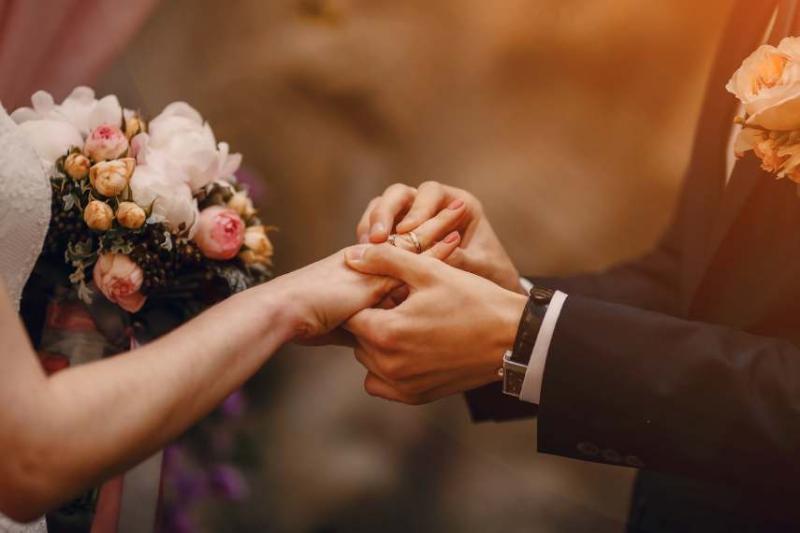
Weddings are big business: it's an industry worth an estimated £10bn in the UK, every year.
Legally, getting married is relatively cheap - £119 for the paperwork and registry - so clearly we're splashing out elsewhere. But how much are we spending, and what are the ways to keep the costs down?
How much do weddings cost?
How much you spend on your wedding depends entirely on the type of day you want. Whether it's a weekend in a country house or simply gathering your family and friends in your local pub, it really is up to you.
Working out your wedding cost can get complicated, fast. The following list gives an idea of what each element of your wedding is likely to cost:
- Venue: £7,500
- Catering: £4,200
- Photographer: £1,300
- Invitations: £200
- Dress: £1,300
- Suits: £700
- DJ/Music: £900
- Flowers: £800
This list isn't exhaustive, but it gives you an idea at the kind of costs you could be looking at.
Where do people spend the most on weddings?
Online wedding planning platform Bridebook reported that British couples spend on average £19,184 on their big day - and £24,069 including the ring and honeymoon.
The biggest spenders are, perhaps unsurprisingly, in London. Almost everything costs more in the capital, from the venue to the photographer. Their average bill comes to £28,663 whilst couples from Yorkshire spend the least, averaging just £15,968.
When is it cheapest to get married?
Saving money on your wedding is easier when you understand the economics of supply-and-demand. In short, it's cheapest to get married when nobody else wants to.
Most people want to get married when the weather is good; here in the UK you can never be completely sure of the weather, but that's generally from late spring until early autumn.
There's also a spike in bookings around February (because of Valentine's Day) and Christmas/New Year. That leaves January, March, October and November - but be wary of school half-terms.
Saturday is the most popular day for a wedding, simply because of convenience: more guests will be off work that day.
Any other day will be cheaper, but Friday and Sunday still tend to be pricey: Friday because of its proximity to the weekend, and Sunday because venues generally have to pay staff more.
Saving on the reception
The traditional mid-afternoon ceremony leads into a sit-down meal, speeches, a disco and then a late-night taxi back to a hotel. It can easily turn into a long and expensive day for everyone involved, including the guests.
Some venues might try to insist you use their caterers, DJ, photographer and so on - and they'll take a commission on all of it - so make sure you know everything up front before booking.
You can save a lot by booking a non-wedding venue for the reception, if you're planning on having the ceremony at a church or registry office.
Try your local town or village hall, a museum or art gallery. But don't mention the 'wedding' word when you're booking, as this can often prompt an inflated fee for seemingly no reason at all.
Dresses
When it comes to the bride, most of the time wedding dresses do cost a small fortune (on average, around £1,424) - something we know most brides are more than happy to pay.
But it's always worth looking out for sample sales where shops sell designer dresses at a fraction of the price. Be sure to follow wedding dress boutiques on social media to find out if your favourite shop has a sale on.
You can save on bridesmaids' dresses too. Chances are your bridesmaids will have different body shapes and tastes, so let them choose their own dresses from the high street (perhaps in matching colours). Not only will it save you cash, but it'll help them feel more comfortable too.
Food and drink
Catering is often the single biggest outlay for couples getting married. Most guests will now understand if you ask them to pay for their own alcohol, especially if it's a larger reception where the potential bar bill would be extremely high.
If you don't want to skimp on the quality of your food, think outside of the box in order to save money. Book your ceremony for a later slot and have a cocktail party-style reception serving hors d'oeuvres, or (for larger functions) an antipasti-style buffet of cured meats, cheeses and finger-foods.
This makes self-catering your own wedding easy and affordable, especially if you can negotiate a good deal with your local delicatessens and cheesemongers. Better yet, ask any friends who work in the food industry for their contacts and buy direct from suppliers. No sit-down meal also solves the headache of table planning.
If a sit-down meal is a must, consider swapping the traditional three courses for afternoon tea with sandwiches and cake. This works especially well on a warm summer day.
Can I get a loan for a wedding?
Of course another option is to borrow money to help with the costs. It's not a great idea to plan a wedding with a totally unrealistic budget however a small loan could help you make some of those final payments.
In our experience, couples who take out a wedding loan with Admiral to help pay for their big day, borrow on average £6,800. Interest rates are subject to your individual circumstance and will be explained clearly when you choose to apply for a quote.